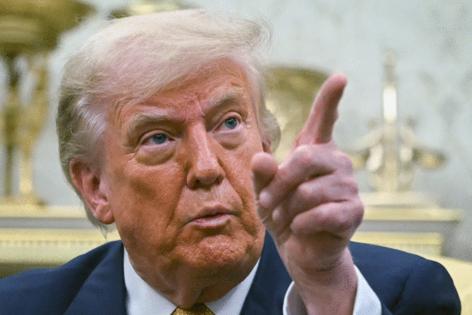Trump signs bill with funding cuts to foreign aid and NPR, PBS
Published in Political News
WASHINGTON — President Donald Trump on Thursday signed a $9 billion package of spending cuts that ends federal funding for public broadcasters and reduces foreign aid, the White House said.
The measure was spurred by onetime Trump ally Elon Musk’s cost-cutting initiative, the Department of Government Efficiency, which sought to shutter agencies and slash the federal workforce in an effort achieve conservatives’ longtime goal of shrinking the U.S. government.
The new law ends a half century of funding for the Corporation for Public Broadcasting, which finances the Public Broadcasting System and National Public Radio. The corporation will now lose all federal funding beginning Oct. 1. Supporters of public broadcasting have warned the cuts will force the closure of smaller rural stations.
That marks a major victory for the political right, which has long bristled at funding for public broadcasters which they see as ideologically biased against their viewpoints and undeserving of taxpayer money.
Trump and his allies have ramped up their attacks against media outlets they see as critical of the president’s agenda and sought to ensure that the federal government is not promoting ideas contrary to his worldview.
The package also cancels funding for foreign aid grants within the U.S. Agency for International Development and smaller agencies like the U.S. Institute of Peace. Musk made dismantling USAID a top focus of his DOGE drive; most of its staff has already been fired and its programs ended in recent months.
Critics, such as Senate Minority Leader Chuck Schumer, have said the aid cuts would harm starving children abroad and allow China to grow its influence in other countries by stepping in to fill the humanitarian aid gap.
While Musk left DOGE in May, and has since had an acrimonious falling out with Trump over the president’s signature tax law, the rescissions package highlights how the administration is pushing ahead with its cost-cutting by enlisting Congress to approve them.
The Senate bypassed the usual appropriations process to pass a partisan discretionary spending cut for the first time in decades. Rescission packages can pass the Senate with just 50 votes instead of the usual 60 as long as they are acted upon within 45 days. Two Republicans joined Democrats in voting against the measure: Senators Lisa Murkowski of Alaska and Susan Collins of Maine.
The White House plans to send more rescissions to Congress based on cuts identified by DOGE.
White House budget director Russell Vought has declined to say which agencies will be targeted in the next package. He has argued that any proposals made after Aug. 15 would result in an automatic cancellation of funds if Congress fails to act before Sept. 30. Such “pocket rescissions” would likely be challenged in court.
_____
©2025 Bloomberg L.P. Visit bloomberg.com. Distributed by Tribune Content Agency, LLC.

























































Comments